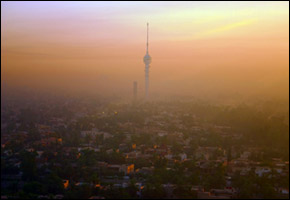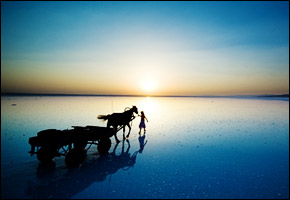Q&A: Jennifer Turner on Water Challenges for Growing China
The following is the full transcript of Circle of Blue’s interview with Jennifer Turner. The interview was done as part of the Circle of Blue’s coverage of the Asia Society Leadership Group’s new report on China’s water challenges. The interview was conducted by Aaron Jaffe and the audio was edited by Nadya Ivanova for Circle of Blue.
And I think that when you are interested in water in Asia, you need to look at China — China not only being the largest country, but that China’s economy is one that has buoyed the whole region, as well as the globe. We buy all their products.
So let’s start with China. We think, not front-page news, the big topic linked to China, of course, is the Himalayan glacier melt, which is linked to climate change. The glaciers are melting. And there are estimated ranges that by 2050 there may be a 75 percent retreat of glaciers in the Tibetan plateau and that in the Tibetan plateau these glaciers supply something like, I get weird numbers, like 40 percent of the global population. You have to think that the glaciers supply water for major rivers throughout Southeast Asia, and the people dependent on them is huge. That’s a global water issue. It’s global climate change, and it’s having a very direct impact on the mountains.
But now, let’s talk about China in terms of their water problems. China is upstream of the Mekong, the Salween, these major rivers that flow into Southeast Asia. China is a very energy hungry country, so it’s not surprising that they are damming the rivers. They’ve got two major dams on the Mekong, and third, fourth, fifth, sixth and seventh ones are planned. They’re putting in these dams without regard to the impact on Southeast Asia.
Besides dams on the Mekong, they’ve also been doing some channelization projects to try to, basically they dynamite the shoals and try to help improve shipping. These are done without consideration of the impacts on the downstream countries.
Now, it’s not to say that the downstream countries are also free of guilt in their management of the water. If you look at Vietnam, Laos, all of these countries downstream on the Mekong are also damming the tributaries to the Mekong and dredging. There is the Mekong River Commission, but no country is looking at this river as a whole, at the region as a whole, in terms of taking care of it.
There is the strong, short-term interest of needing energy. These are poor countries, Laos in particular. Fisheries are being destroyed, and because the dams are going in, they are not getting the siltation necessary. Agriculture is disrupted in many of the countries in Southeast Asia because of the dams further upstream in China. So many people in Southeast Asia, Laos, Vietnam — it’s subsistence is agriculture, it’s subsistence fishing. They lose their livelihood.
So there is a question, well, where will these people go? Obviously, a lot of people will have no choice but to go into the cities.
There are many other drives of urbanization throughout Asia. Some of it is that governments want to urbanize because that’s seen as modern, but you have these megacities that are growing that are not always happy places. You have slums. There are so many that are coming into these cities that have no way of living. Also, as these cities grow, again not everyone coming into these cities are poor, but as these cities grow, they need water. They need electricity. Urbanites consume more. It’s a basic fact. The question is where is this water going to come from? What will happen when cities can’t get the water?
I’m speaking at a very general, 30,000-feet level. Let’s say if we go back to China, the government has a major strategy of urbanizing even more of the population than are already urbanized. It’s seen as an important way to promote development, modernization. And not just on the coast. For many years they’ve been doing investments in smaller counties throughout the country to make them big. There is no such thing as a small town in China. Again, cities, they need water. Something like two-thirds of Chinese cities at some point throughout the year are water short.
In northern China cities, as well as the agriculture, they depend on ground water. Agriculture in northern China is 40 percent dependent on ground water. This is not sustainable. There are big questions about what happens when you have cities in China — we could tell stories about throughout Asia but I know China best — what happens when you have these megacities and you don’t have water? When I focus on China’s environmental issues, for me, water’s the most important issue.
Obviously, there are a lot of air pollution problems in China: 750,000 people die every year from respiratory illnesses. Maybe the numbers seem lower — only 60,000 people die from diarrhea, from dirty water every year in China. The numbers aren’t as great, but I think there are many, many more hundreds of thousands of people in China who are getting sick, who are getting cancer, who have low IQs due to contaminated water in China. I see water as the big issue, and I think that’s China’s biggest environmental issue.
There are a lot of cross sections among these issues. The water energy linkage, for example: Northern China’s very water short, and that happens to be where the coal comes from. You have to use water to clean the coal, but there’s not enough water to clean the coal, so we don’t clean the coal. So China burns very, very dirty coal. That’s a definite linkage.
I guess, I’m not always a big thinker so I can bring all these desperate issues together, but I think that, ultimately, when you look at so many of China’s environmental issues and social and political issues, so many of them I can link it back to water.
I think, in the next few years there probably will be more major pollution accidents that are going to bring the issue higher on the agenda. Two years ago there was a major chemical spill in Northeast China that was highly publicized, and it has been something that has done a lot to really raise the awareness of the public. It did lead the government to revise their water pollution control law in a way that raised penalties significantly, got rid of a lot of previous loopholes that essentially just let industries pollute because there’s money in that production and, oh well, so it’s polluting the river, the river goes downstream. The people now can sue and officials can lose their jobs. I think, that’s a very encouraging sign — to finally see what is now the strongest water pollution control that China has ever passed.
Chinese journalists are also doing a lot more reporting on water pollution issues. I’ve got one of my research interns gathering the information — there’s also a lot more citizen blogging going on environmental issues, and I think a lot of it is related to water.
I think that water is a topic that is a very emotional one for people, and I think it could actually be one where we’re going to see a lot of progress in terms of pushing political change in China. That’s what makes me optimistic.
Circle of Blue Radio is made possible with generous support from Traverse Legal PLC.
Circle of Blue provides relevant, reliable, and actionable on-the-ground information about the world’s resource crises.








Leave a Reply
Want to join the discussion?Feel free to contribute!